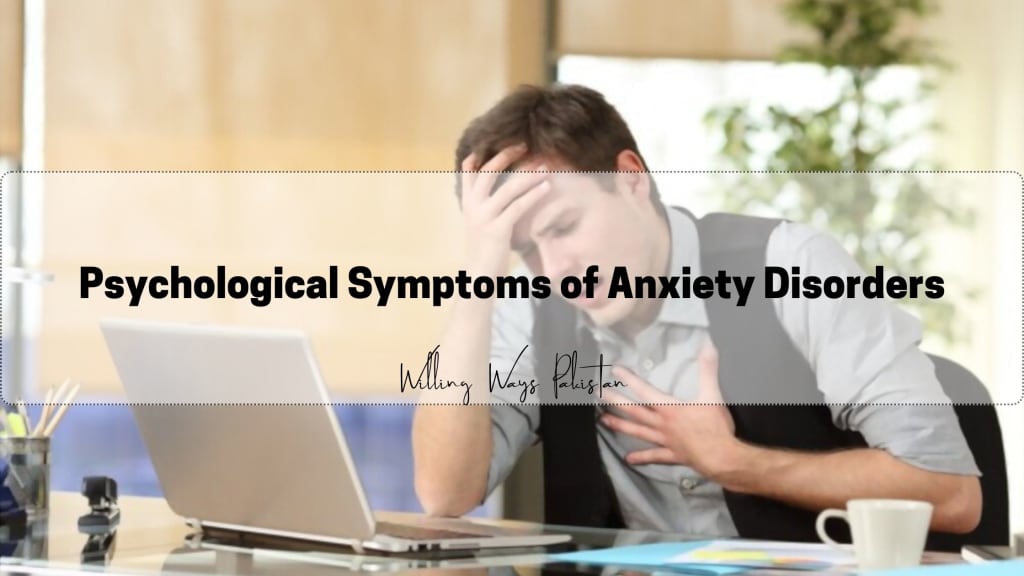Psychological Symptoms of Anxiety Disorders
Not every individual experiences all of the signs, and the combination of anxiety disorder symptoms will vary from one person to another.

Although anxiety disorders are purely mental conditions said by the experts of the best addiction treatment center in Pakistan and affect the patients’ way of thinking and perception, not all anxiety disorder symptoms are psychological. Being in a state of constant anxiety, worrying, fear and confusion bring up to the surface the Symptoms of Postnatal Depression in women, which are a lot of physical symptoms. Those physical symptoms commonly present in different and completely unrelated illnesses and medical conditions. Still, they are also adding their toll on the misery of anxiety disorder sufferers.
When just a few symptoms show up simultaneously, depending on their severity and type of anxiety disorder, they can easily lead to the victims’ worst nightmare, called a “panic attack.”
Below are listed some of the most common symptoms of which anxiety disorder sufferers complain. Not every individual experiences all of the signs, and at the same time, the combination of anxiety disorder symptoms will vary from one person to another.
Overwhelming, constant worrying and tension - Minor and sometimes wholly unimportant issues and tasks can suddenly become a big concern. Patients can spend countless hours going in circles, trying to think of the best solution and timing to undertake the action and resolve the “problem.” At the same time, they might think that everyone around them is watching their every move, making them even more anxious, confused and clueless.
Decreased confidence and increased self-consciousness - People start analyzing themselves and their actions critically and sometimes disrespectfully. Nothing they do is good enough any longer, and they feel as if they are losing every single “battle” with the outside World. Even the simplest tasks a patient enjoyed doing before and in which they might have an excellent track record (like driving a car, for example) can suddenly become a burden, and a person will start questioning their ability to complete the task.
Avoidance - Places and situations in which people experience some fear, discomfort or embarrassment may soon find themselves on an “unsafe list,” and some anxiety disorder sufferers will proclaim them as “no-go zone” and try to avoid them as the plague. If not recognized and treated initially, this behaviour could quickly develop into severe agoraphobia. The person suffering from it will very fast have a very long “unsafe list.” It is not unusual for some victims to become “prisoners” of their homes or, even worse, their rooms.
Fear of impending disaster - Seeing the outcome of every otherwise very normal and ordinary situation in a disastrous and the worst possible way. Fearful thoughts like: How will we escape if the house catches on fire while everyone is sleeping? Will my loved ones safely arrive at and from school or work? Thoughts similar to these arise when there is nothing that would even distantly suggest something shouldn’t be just fine.
Irritability - Most people suffering from anxiety disorders get irritated very easily. A simple denial, disapproval or a negative critique could make them angry or annoyed. It will also take much longer for them to forget and move on.
Difficulty in concentration - Concentrating on the routine, everyday jobs and tasks suddenly may become very difficult and sometimes even impossible. Lack of attention might be present even during supposedly relaxing and fun times like watching a movie or listening to a favourite piece of music.
Insomnia - The minds of anxiety disorder sufferers work over the clock, so it is not surprising that for them to get enough, good-quality sleep is usually challenging. Nightmares and even panic attacks can occur during sleep, making it almost impossible to rest the exhausted bodies and minds properly. Insomnia, and therefore, tiredness and frequent yawning are integral parts of many anxiety disorder victims.
Sensibility to noise - Some anxiety disorder sufferers become very sensitive to noise, particularly, but not limited to, excessive noises like loud music or a TV set, noise from a busy street and even loud talking. On the other hand, the complete silence also annoys them. When the anxiety starts to build up, it is not unusual for the patient to hear “imaginary noises,” which sometimes can feel like listening to several radio stations simultaneously. Anxious people are also easily scared by sudden, unexpected noises.
Confusion and disorientation - Sufferers might feel very confused from time to time. Sometimes, especially when anxiety reaches its peak or during a panic attack, they can feel completely lost and disorientated. However, those episodes usually result from fear, and they don’t last for a long time.
Derealisation - Patients have a perception that everything around them is unreal. The situations in which they find themselves and all the surrounding objects seem like a dream or a product of their imagination.
Depersonalization - Loss of personal identity. People might be physically present at some place, but in their minds, they feel like they are not there. Walking through a busy shopping mall, an anxiety disorder sufferer feels invisible, completely isolated and not part of the surrounding crowd.
Fear of dying, going insane or losing control - Anxiety disorder victims are deeply concerned about their negative or confusing thoughts and might become utterly obsessed with them. This is just adding more fuel to the fire. Even the slightest discomfort and disturbances might raise the alarm, and the patient will think that the worst is coming.
About the Creator
Willing Ways
Willing Ways is the Best addiction treatment center in Pakistan. We are the pioneer in drugs & alcohol treatment centers with outstanding services and a history of 43 years. We deliver quality writing that is beneficial for you.






Comments
There are no comments for this story
Be the first to respond and start the conversation.